- HOME
- Alumni News
- Activity Reports
- The Milestone conducted a training for officials of a provincial government, Pakistan
Activity Reports
The Milestone conducted a training for officials of a provincial government, Pakistan
Milestone Conducts
Training for KP.Govt.Officers
“Nothing about Us without Us”
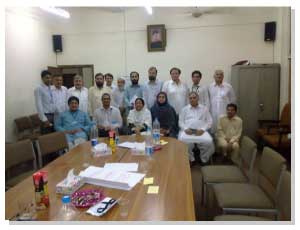
Date: 19th May, 2013
Time: 10am to 04pm
Organizer: JICA Pakistan
Venue: Peshawar, Khyber Pakhtunkhwa Province
Participants: 13 Government Officers from different departments
Facilitators: Mr.Shafiq Ur Rehman (Milestone) Lahore & Mr. Rizwan Ijaz (Milestone) Lahore
JICA (Japan International Cooperation Agency) is launching a project in Khyber Pakhtunkhwa (KPK) Province of Pakistan after successfully implementing a project titled “A Star Project” in Abbottabad, where disabled persons and their families were sensitized to issues around inclusion. The project received many appreciations and served the disabled community in the best possible manners. In the present project in KPK the government official were targeted to be provided with the training on disability issues and to be sensitized to the needs and inclusion of the disabled.
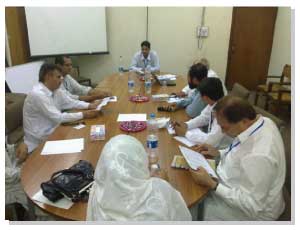
Milestone Society for Special Persons (the Milestone) served as a consultant for the provision of training on disability issues and shared its expertise with the government officers of Khyber Pkhtunkhwa in Peshawar. Mr. Shafiq Ur Rehman and Mr. Rizwan Ijaz from the Milestone facilitated the training and, being former trainees of the Duskin Leadership Training Program, shared their expertise and experience in the disability movement in Pakistan. They were also experienced in serving persons with disabilities in Pakistan through different delivered projects that produced agents of change and sensitized masses throughout the country.
Mr. Muzammal Islam from JICA welcomed the participants and introduced the Milestone. Talawat e Quran E Pak was observed and then Mr. Rizwan Ijaz initiated the training for government officers who were dealing with disability issues and representing different departments. Mr. Rizwan Ijaz introduced himself with his experience in working in the disability field for more than 13 years and requested a formal introduction of all participants in order to make them know each other and conduct training in participatory manners. Making Rules of the Day session was observed in the start of the training where participants were requested to make rules of the training day that included what was allowed and what was not. The method adopted here was Sticky Notes that were to be pasted on a Flip Chart, the participants expressed their reservations on sticky notes and made rules such as ‘using cell phones during training is not allowed,’’ leaving training room during sessions is not allowed’ etc.
The first session of the training entitled What Disability Is? was unfolded by the facilitator Mr. Shafiq Ur Rehman, who encouraged the participants to think and express their views about what they think and know about disability. The method adopted was Open Discussion in participatory manners. This discussion lasted a half an hour where all the participants expressed their views and preconceived notions about disability. This session was very important for further training as it provided the foundation and road map showing the way the training would be conducted. In addition, it clarified which clichés and idols needed to be challenged as generally speaking many people are not very aware of disabilities and they mostly consider disabled persons either a patient or a receiver of some spiritual punishment for past sins.
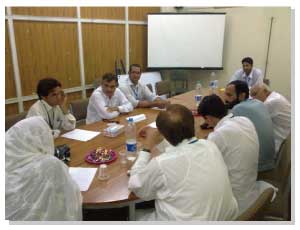
But it was encouraging to note that most of the participants were much sensitized about disability issues and they had no pity-based approach. The discussion opened new horizons of knowledge about disability. Participants raised different questions that were answered by Mr. Shafiq Ur Rehman, who made participants think again about disability. Sharing his international experience, he informed that he did not feel disabled in countries like Japan and Korea for the reason that these countries were barrier free and inclusive and disabled persons are provided with all facilities needed. He provided the participants with knowledge and issues associated with different types of disability such as physical, visual impairment, hearing impairment and intellectual.
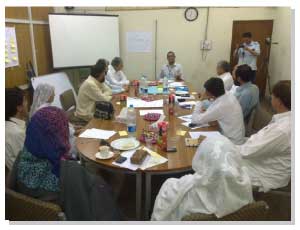
The next activity observed using sticky notes was Best Part of Body?, where participants were requested to think and write down what part of their body they felt best about. Some of them wrote hands, some of them eyes, some of them wrote brain. Mr. Shafiq Ur Rehman asked them what you have done to have these parts of body from ALLAH – “Is it your effort?” All of them replied, “No.” So this is the important to note that these are all blessings of ALLAH ALMIGHTY, so if some people had a disability why should they be discriminated against in society? In fact, all of us are the creation of ALLAH and HE is the best creator so if we think and label someone disabled it means that we are challenging the creation of ALLAH being imperfect. We have to think again and treat all human beings as equal and graceful as all of us are the creation of ALLAH. Stop discrimination and stop pity-based approach; we have to create an inclusive and barrier free society for all. Everyone is equal but different was the concluding remarks for this session.
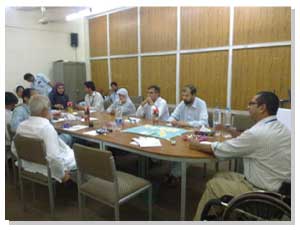
The role of government in this concern was discussed and it served as comparative study. The role of government and facilitation of persons with disabilities in developed countries were discussed. Mr. Shafiq Ur Rehman shared his experience of working in Bait Ul Mal and as Prime Minister Secretariat and sensitized the participants to adopt inclusive approach as it creates inclusive society.
The regime of Zia Ul Haq former President of Pakistan was unfolded as he initiated Special Education for persons with disabilities, being father of a disabled daughter himself. The sessions prompted comments like; we are such inhuman natured persons that we do not understand anything till it happens with us; we do not have equality and justice, we lack human approach that is the reasons we are lacking behind in the this progressive world. We have to revise our approaches and treat all human beings equally and as respectable part of the society. Special education institutions are like cages and zoo for us all, and how we discriminate against and set aside the creation of ALLAH, thus this is a sheer inhuman approach.
History of Disability Movement was the food for thought for the second session, where Mr. Shafiq Ur Rehman unfolded the history of disability movement and how it started and flourished in the world. He described the role of Ed Roberts from the US, who initiated the ideas of Independent Living for persons with disabilities and talked about how this philosophy traveled to Japan and Korea. It is worth mentioning here that the Milestone introduced the concept of Independent Living in Pakistan in 2001 and there has been a positive change in the lives of persons with disabilities The philosophy produced agents of change in the whole world who serve as inspiration for others to get independent to live their life as productive and respectable part of society. The participants raised questions regarding the topic that were satisfactorily answered by Mr. Shafiq Ur Rehman.
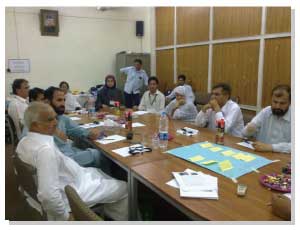
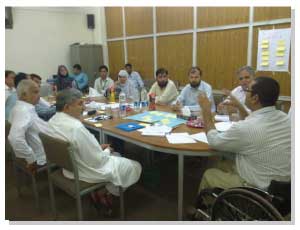
After lunch and Prayer Break, the third session called Personal Assistant Service was initiated by Mr. Shafiq Ur Rehman in a participatory manner. The participants were requested to use sticky notes and write three services that they receive from society. It was food for thought for the participants to understand the idea of personal assistant service for persons with disabilities. All the participants wrote different services that they receive and pay like getting hair cut, getting dressed stitched, getting transportation to travel etc.
Mr. Shafiq Ur Rehman informed the participants that all of us receive services from society as we cannot perform all the tasks for ourselves and in this situation we receive service from others and pay for that.
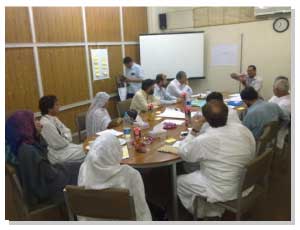
This is the essence of personal assistant service for persons with severe disabilities and an important component of the philosophy of Independent Living. Persons with severe disabilities use a personal assistant who performs tasks advised by their client.
Governments in developed countries like the US , Japan and Korea have developed this system and persons with severe disabilities receive personal assistant services from government. However in Pakistan, this service has not yet been initiated by the government and instead millions of rupees are wasted in the promotion of begging in the shape of Income Support Programs. It is important to note that a disabled child is not the responsibility of government but the responsibility of state in the developed countries but we lack such human approach. Persons with disability have to face discrimination in their entire life and they can never be a productive and positive part of society. The participants raised different questions and expressed their views about the importance of personal assistant service for persons with severe disabilities.
In the last part of the training program, all the sessions were briefly revised and evaluation forms were filled in by the participants.
Reporter: Rizwan Ijaz
(13th program, Pakistan)




